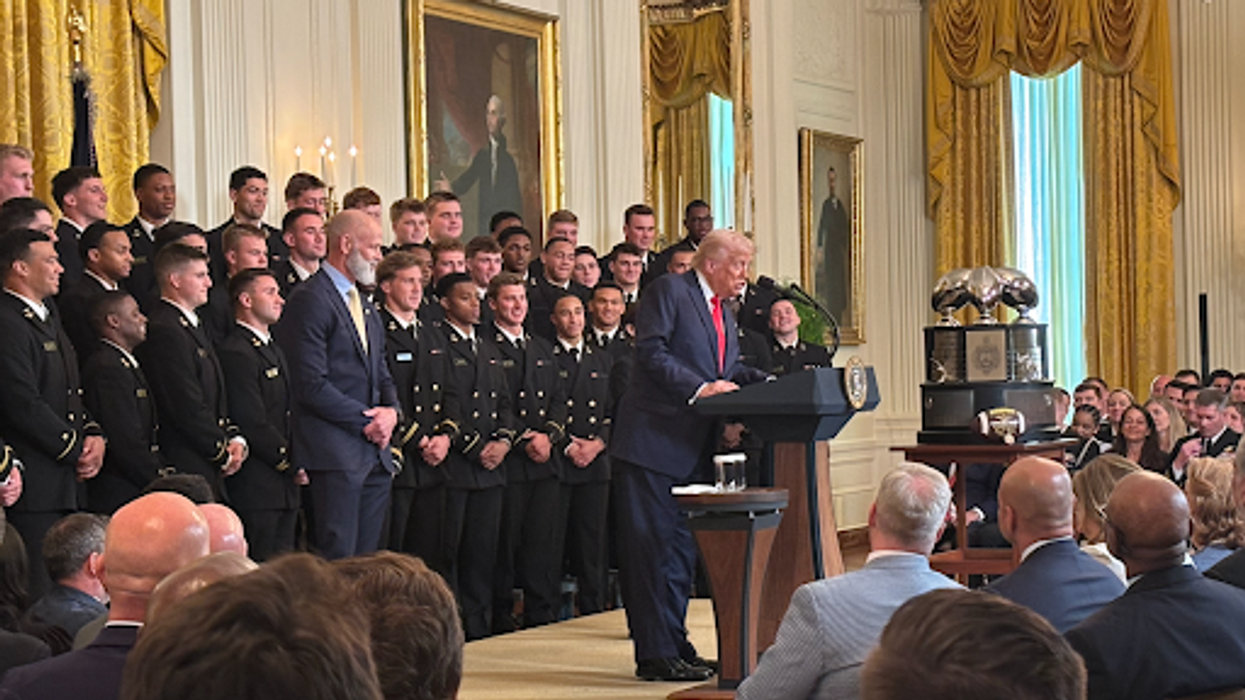WASHINGTON – With grit and team camaraderie, the Navy Midshipmen football team marched into the White House Tuesday, ready to hoist the Commander-in-Chief Trophy for winning the series in December against the Army and Air Force academies.
Their performance, both on and off the field, mirrored the kind of resilience and relentless spirit Trump said he wanted to see across the entire U.S. military.
“You showed the world the Midshipmen know how to fight, fight, fight — and win, win, win,” President Donald Trump said, beaming at the players lined up in the East Room.
Trump welcomed the team to celebrate their win over the Army 31-13 to clinch the annual series among the Army, Navy, and Air Force academies. He celebrated them for bringing the coveted 170-pound trophy back to Annapolis and showcasing the pride and playful rivalry that make this game a one-of-a-kind tradition.
To Trump, their season was not just a triumph in football; it was a testament to the mindset he believes must define the next generation of service members.
“They're not just great football players, and you can see this, that they are just amazing people. They're true American warriors and future submarine captains and fighter pilots and Marine infantry and Navy SEALs,” Trump said.
Their season, which began in February 2024 before they ever stepped onto the field, started in the academy’s weight room, where pictures of the Commander-in-Chief Trophy were plastered on the walls as daily motivation. That focus carried them to victories over both the U.S. Military Academy’s Army Black Knights and the U.S. Air Force Academy’s Falcons. The Midshipmen won 10 out of 13 games, with nine of those wins by double digits.
Trump praised the team’s hard work and spotlighted several key players in his remarks, including fullback Daba Fofana, quarterback Blake Horvath, linebacker Colin Ramos, free safety Rayuan Lane III, and nose guard Landon Robinson.
“First ever big shipment with two pick-sixes and a single game comeback,” Trump said, noting the season's defensive highlights.
Lane, a senior leader on the team, responded to the praise: “It’s an honor to be here. Thank you for the support. You know, go Navy, beat Army!”
Trump attended the 125th Army-Navy game in December and called it “one of the best ever between schools,” He said the team's dominance this year has cemented their place in history.
“With the win, this trophy, you secure your spot as one of the greatest teams in Navy football history,” he said.
Trump also reflected on his role as Commander-in-Chief.
“I have no higher honor than serving as the commander in chief of America's Armed Forces,” he said. “Today, I'm proud to announce that in February, the U.S. Navy had its best recruiting numbers since 2002.”
Before the election in October, the Navy announced it would be contracting over 40,000 recruits for fiscal year 2024. They said it was the most significant recruiting number in 20 years.
He held up the team as a model — not just of athletic excellence, but of the uncompromising attitude he wants to see driving every service member.
Trump also promised continued military investment: “As long as I'm commander in chief, the United States will always have the strongest, fiercest, and most powerful Navy on the sea. We're going to restock it like it hasn't been restocked before. We're going to have a trillion-dollar budget.”
Trump held up the Midshipmen football team as a symbol of a revival he wants for the military, grounded in discipline, toughness, and pride.
“There’s a lot of spirit right now in the country that we didn’t have six months ago,” Trump said.
Trump was flanked by top military leaders, including Secretary of Defense Pete Hegseth, Secretary of the Navy John Phelan, Gen. Dan Caine, chairman of the Joint Chiefs of Staff; Adm. James Kilby, acting chief of naval operations; Naval Academy Athletic Director Chet Gladchuk, and Vice Adm. Yvette Davids, superintendent of the Naval Academy.
He joked with the team about his own missed football opportunity. “I wish I could have joined you, but I was never too much into it anyway,” Trump joked. “I should have done it. I could have been president someday.”
Trump and the crowd laughed loudly.
Head Coach Brian Newberry expressed pride in his players and in what they represent.
“We’re proudly representing the United States Naval Academy, the entire brigade of midshipmen, and all the men and women serving in our Navy and Marine Corps—past and present,” he said.
He also recognized the seniors on the team: “In a little over a month, these 23 seniors, these incredible young men standing behind me, will graduate and commission as officers of the United States Navy and Marine Corps under your command, Mr. President. They will do so with tremendous character and the core values of duty, honor, courage, and commitment.”
After the ceremony, team co-captains Ramos and Fofana presented Trump with a Naval Academy keepsake football, a gesture of thanks for the celebration and recognition.
Bridget Erin Craig is a graduate student at Northwestern Medill in the Politics, Policy and Foreign Affairs specialization. She graduated with a B.A. from the University of Miami in Political Science, Criminology and Sustainable Development.
Matthew Shea is a congressional reporter for Medill News Service, focused on National Security and Foreign Affairs. He is also a graduate journalism student at Northwestern University‘s Medill School. Before Medill, Matthew graduated with a B.A. in journalism from the University of Maryland.




















